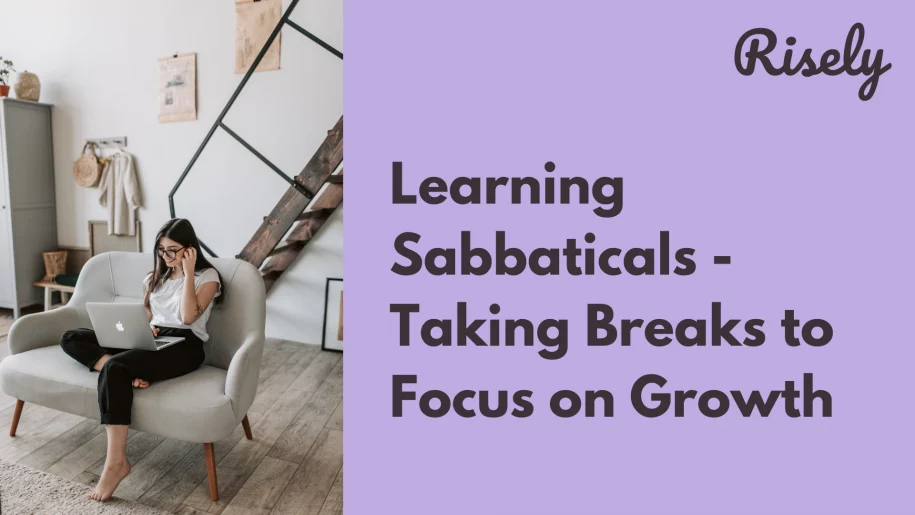Learning Sabbaticals – Taking Breaks to Focus on Growth
Do you feel like your career growth has hit a plateau? Are you looking for ways to improve your skills and knowledge but can’t find the time? A learning sabbatical may be just what you need! Taking a break from work to focus on personal or professional growth can lead to numerous benefits, including increased creativity, better problem-solving abilities, and improved job satisfaction. This blog will explore what a learning sabbatical is and how it can benefit you. We will also discuss how managers can use learning sabbaticals to improve team performance and provide tips for planning, preparing, and measuring the success of a leave. Join us as we delve into the world of learning sabbaticals and discover the importance of ongoing learning for employee development.What is a learning sabbatical?
A learning sabbatical is a break from daily life to concentrate on personal development through travel, courses, workshops, or hobbies. The aim is to gain new skills or knowledge applicable to personal or professional life. A learning sabbatical can provide a fresh perspective and renewed energy. A learning sabbatical can take many forms depending on the individual and their goals. Generally, a learning sabbatical involves taking time away from your regular work or responsibilities to focus on learning and personal development. It could mean enrolling in a formal education program, such as returning to school or taking online courses, or it could involve self-directed learning through reading, research, and hands-on experiences. Some people choose to travel during their learning sabbatical, immersing themselves in new cultures and environments to broaden their perspectives. Others may use the time to explore new hobbies or interests, attend workshops or conferences, or engage in mentorship or apprenticeship opportunities. The key is to design a learning sabbatical that aligns with your interests and goals and allows you to deepen your knowledge and skills meaningfully. Check out: 7 Best Tips to Guide Self-Directed Learning at WorkDifferent types of sabbaticals: personal vs. professional growth
Learning sabbaticals comprise two categories: personal and professional growth. Personal growth sabbaticals are prolonged breaks from work that enable individuals to delve into their interests. Professional growth sabbaticals center around skill development relevant to one’s current role. Critical characteristics of learning sabbaticals include acquiring new skills or knowledge and gaining fresh perspectives on a particular career path. After completion, individuals can apply newfound knowledge to the workplace and demonstrate its relevance to the future of work. Learning sabbaticals are crucial for employee development, enabling employees to enhance machine learning skills without disturbing their daily routines.Other Interesting Reads
Benefits of taking a learning sabbatical
Taking a learning sabbatical can offer numerous benefits, including personal and professional growth, increased knowledge and skills, enhanced creativity, and improved work-life balance. By taking a break from your routine and dedicating time to learning, you can expand your horizons, gain new perspectives, and develop new interests or passions. A learning sabbatical can also provide an opportunity to focus on self-reflection, goal-setting, and personal development. Additionally, the skills and knowledge you acquire during a learning sabbatical can be valuable assets in your career, leading to increased job opportunities and advancement. Lastly, a learning sabbatical allows you to prioritize your well-being and recharge mentally and physically, improving your work-life balance.Examples of companies promoting learning sabbaticals
Several top companies like Google, LinkedIn, and Airbnb offer employees the chance to take a break from their traditional roles and learn sabbaticals. These sabbaticals enable individuals to gain new skills relevant to their current job responsibilities or future professional aspirations. Through these initiatives focused on employee development during the learning sabbatical period, workers can acquire new competencies that will enhance their careers while keeping up with the changing dynamics of the future of work.How to plan and prepare for a learning sabbatical?
To prepare for a learning sabbatical:- Set goals and research learning opportunities.
- Create a budget and plan, stay connected to your network, and plan for returning to work.
- Consider how you can develop new skills and experiences while being mindful of finances and career goals.
Importance of ongoing learning for employee development
Managers can use learning sabbaticals as a valuable tool for team growth and generate great employee experience. By encouraging and supporting employees to take time away from their regular work responsibilities to pursue learning and development opportunities, managers can foster a culture of continuous learning and personal growth within their teams. Learning sabbaticals can be structured in various ways, such as granting employees a set amount of time off each year specifically for learning purposes or allowing them to take extended breaks for intensive training programs or educational pursuits. Managers can also provide resources and support to help employees make the most of their learning sabbaticals, such as recommending relevant courses or workshops, connecting them with mentors or experts in their field, or providing financial assistance for tuition or travel expenses. By investing in their employees’ development through learning sabbaticals, managers can enhance the skills and knowledge of their team members, boost morale and job satisfaction, and ultimately contribute to the long-term success and growth of the organization.Best practices for implementing learning sabbaticals in the workplace
To implement successful learning sabbaticals in a workplace, here are a few best practices:- Set Clear Goals: Define specific learning goals and objectives for your sabbatical. What skills, knowledge, or experiences do you aim to gain? Clear goals will help you stay focused and make intentional choices during your time off.
- Plan Ahead: Create a detailed plan for your sabbatical, including the duration, activities, and resources needed. Consider budget, logistics, and any necessary approvals or arrangements with your employer. A well-thought-out plan increases the likelihood of a productive and successful sabbatical.
- Communicate with Your Employer: Notify your employer well in advance about your intention to take a sabbatical. Discuss the purpose and potential benefits of the sabbatical, and ensure you are aware of any company policies or requirements. Open and transparent communication can help maintain a positive relationship with your employer during the sabbatical.
- Financial Planning: Assess your financial situation and plan accordingly. Determine how you will cover your expenses during the sabbatical, considering factors such as living costs, learning materials, travel, and any loss of income. Saving in advance or exploring funding options can provide peace of mind and reduce financial stress.
- Select Learning Opportunities: Identify suitable learning opportunities that align with your goals. It could include enrolling in courses or workshops, attending conferences or seminars, undertaking self-study projects, or engaging in experiential learning activities. Choose activities that offer high-quality content and are relevant to your interests and career aspirations.
- Create a Structured Routine: Establish a structured routine during your sabbatical to maintain focus and productivity. Set aside dedicated time for learning, reflection, and personal development. A routine can help you stay organized, manage your time effectively, and progress toward your learning goals.
- Reflect and Document: Incorporate reflection and documentation practices into your sabbatical experience. Regularly reflect on your learning, how it connects to your goals and any insights gained. Consider journaling, creating a learning portfolio, or sharing your experiences through a blog or social media. This process can enhance self-awareness and help capture the value of your sabbatical for future reference.
- Maintain Connections: Stay connected with your professional network and industry during your sabbatical. Attend relevant events, join online communities, or engage in networking opportunities. Keeping in touch with colleagues, mentors, and industry trends can contribute to your learning journey and facilitate reintegration into the professional sphere after your sabbatical.
- Embrace Self-Care: Prioritize self-care and well-being during your leave. Take breaks, engage in activities that rejuvenate you, and practice self-care routines that promote physical and mental health. It will help maintain your energy, motivation, and satisfaction with the sabbatical experience.
- Evaluate and Apply Learnings: Towards the end of your sabbatical, evaluate your progress and the impact of your learning. Reflect on how you can apply your new knowledge and skills to your work or personal life. Create an action plan for integrating what you’ve learned and continue building upon your sabbatical experience beyond its conclusion.
Conclusion
Learning sabbaticals are an excellent way to take a break from the hustle and bustle of work and focus on personal or professional growth. Investing time in yourself can improve your skills, develop new talents, and enhance your overall well-being. Managers can also use learning sabbaticals to foster team growth and increase employee engagement. To ensure the success of your learning sabbatical, it’s crucial to plan and prepare for it well in advance. Set measurable goals, create a learning plan, and establish metrics to track your progress.Effective goal-setting is the key to making the most of your time.
Can you set goals for yourself and your team to ensure success. Find out now.
What is a learning sabbatical?
A learning sabbatical refers to a period of time taken off from work or formal education to engage in focused learning and personal development activities. It allows individuals to explore new interests, acquire new skills, or deepen their knowledge in a specific area. Learning sabbaticals are often self-directed and can take various forms, such as attending workshops, traveling, or pursuing independent study.
What are the benefits of sabbaticals?
Benefits of sabbaticals include opportunities for personal growth, skill enhancement, renewed motivation, increased creativity, and a chance to explore new perspectives. They can also provide a break from routine, reduce burnout, and enhance overall well-being.
What is the disadvantage of sabbatical?
However, the disadvantages of sabbaticals are the potential interruptions to career progression or financial constraints that may arise during the period of absence.
Other Related Blogs
How to Create a Course with AI: A Guide for L&D Professionals
How to Create a Course with AI: A Guide for L&D Professionals According to a McKinsey survey(1), only 11% of business leaders believe their leadership development initiatives yield meaningful results.…
How to build a Learning and Development Action Plan ft Katie Greenwood
How to build a Learning and Development Action Plan ft Katie Greenwood Does your company’s Learning and Development (L&D) strategy feel like more “guessing” than “winning”? You’re not the only…
Generative AI for Learning and Development: Getting Started
Generative AI for Learning and Development: Getting Started In 2024, organizations spent $401 billion globally on corporate training(1), yet 70% of employees report feeling unprepared for the future of work…
Future proofing a learning strategy for organizations with Inna Horvath
Future Proofing a Learning Strategy for Organizations with Inna Horvath With the advent of AI, everyone’s anticipating changes. L&D leaders in charge of building a learning strategy for organizations are…


